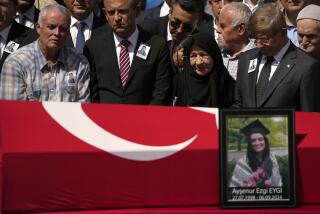Israel refuses to apologize to Turkey for flotilla deaths
Defying U.S. pressure to mend fences with Turkey, the Israeli government said Wednesday that it would not apologize for killing nine Turkish activists last year on board a pro-Palestinian protest flotilla that was attempting to break Israel’s blockade of the Gaza Strip.
U.S. officials had been pressing Israel to formally apologize for the incident as part of a proposal to repair ties between the two significant American allies. Turkey recalled its ambassador and nearly broke off all diplomatic relations with Israel in protest over the May 2010 flotilla clash.
After months of negotiations between the two regional powers, Israeli Prime Minister Benjamin Netanyahu was unable to convince his right-wing coalition government to accept the deal. Conservative politicians, including Israeli Foreign Minister Avigdor Lieberman, said an apology would be interpreted as a sign of weakness.
Netanyahu informed Secretary of State Hillary Rodham Clinton of the decision during a telephone call Tuesday, Israeli media reported. The Obama administration fears that the breakdown in ties between Israel and Turkey could further destabilize the region.
Turkish Prime Minister Recep Tayyip Erdogan said Wednesday that relations would not be restored without Israel’s public acceptance of responsibility and compensation to victims and their families.
Activists on one of the flotilla’s boats attacked Israeli soldiers with knives and pipes as the troops tried to seize their craft in international waters. A U.N. probe into the incident is expected to release its findings in the coming days.
Israel offered to pay compensation as long as its soldiers were protected from lawsuits, but resisted a formal apology.
Analysts said both governments appear more concerned about looking strong in the eyes of their citizens than improving regional stability.
“Leaders on both sides are having this fistfight over the honor of their countries, but they’re overlooking their interests,” said Alon Liel, former Israeli ambassador to Turkey. “It’s completely crazy to not find a diplomatic solution. It’s not that complicated.”
Echoing the concerns expressed by Americans, Liel said the recent upheaval in surrounding Arab countries makes a close relationship between Israel and Turkey even more essential.
“Look at the turmoil going on in the Middle East, especially now in Syria,” he said. “These two stable countries need to coordinate their activities and renew a strategic dialogue.”
Relations between Israel and Turkey have been on the decline for some time. Once one of Israel’s only Muslim allies, Turkey in recent years forged closer ties with Israeli enemies such as Syria and Iran.
Conditions soured further when Deputy Foreign Minister Danny Ayalon embarrassed the Turkish ambassador last year by summoning him to the ministry for a dressing-down in front of journalists and intentionally seating the ambassador on a lower sofa. Ayalon later apologized.
In response to Israel’s refusal to apologize, some predict Turkey may expel Israel’s ambassador or reduce economic ties. Military cooperation between the countries had already slowed to a halt.
Erdogan has also threatened to visit the Gaza Strip, the Palestinian territory controlled by the militantly anti-Israel group Hamas, which would be seen as a challenge to Israel’s efforts to isolate the enclave.
A spokesman for Netanyahu declined to comment on the demand for an apology, but said Israel remains interested in improving relations with Turkey.
“The prime minister has said on several occasions that he’d like to see the Israeli-Turkish relationship on a more positive trajectory,” said government spokesman Mark Regev. “We didn’t want and didn’t initiate the deterioration.”
A decline in relations with Turkey would further isolate Israel in the region, analysts said. Already, Israel has lost a key ally in deposed Egyptian President Hosni Mubarak. Jordan has expressed exasperation with Netanyahu over the lack of Palestinian peace talks. The Palestinian Authority is preparing for a diplomatic showdown against Israel in the U.N. next month over the Palestinians’ bid for formal statehood recognition.
And though Syrian President Bashar Assad was never a friend to Israel, his regime was viewed by Israel as predictable, so many here are nervous about what might replace his government if Assad falls amid rising public protests.
Israeli leaders who opposed calls for an apology said it would hurt the country’s image.
“God forbid we apologize,” Deputy Prime Minister Moshe Yaalon told a group of Likud Party officials Tuesday. “National pride is not just something people say on the street, but it has strategic significance. If Erdogan goes around afterward and says that he brought us to our knees, he will appear as a regional leader in the Middle East. He won’t leave it alone, even after we apologize.”
More to Read
Sign up for Essential California
The most important California stories and recommendations in your inbox every morning.
You may occasionally receive promotional content from the Los Angeles Times.










